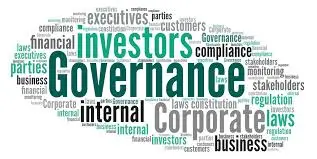ROLE OF GATEKEEPERS ON THE EFFECTIVENESS OF CORPORATE GOVERNANCE
- Author (s) Mohd Uzair

Table of Contents
ABSTRACT
One of the key ingredients for the success of a business of any size is corporate governance. Basically, Corporate Governance is an apparatus by which the companies are governed as well as directed by the management of the business entity. Governance structure and principle identify the distribution of rights and responsibilities among gatekeepers such as directors, auditors, creditors, managers, and other stakeholders. Corporate scandals/scams of various forms have maintained a public and political interest in the regulation of corporate governance. Corporate governance assists the business entity in the improvement in self-reputation of a firm in the market as well as aid the entity to become successful in creating a positive perception in the market. Due to corporate governance chances for conflict as well as scandals diminished. Generally, good corporate governance increases the profit of a business entity, helps in the retention of the employee as well the role of the gatekeeper get more clarified. This apparatus in the age of globalization generally has the responsibility to safeguard the interest of all stakeholders. So, in this case, we are hereby going to discuss how these gatekeepers are unable to perform their function and as consequence, several scams emerged.
Keywords -: Corporate Governance, Globalization, Corporate Scams, Gatekeeper.
‘Corporate Governance’, is claimed to be the ‘the system of rules, practices, and processes by which a firm is directed and controlled. Corporate governance basically entertains balancing the interests of a company’s many stakeholders, like shareholders, management, customers, suppliers, financiers, government, and also the community.’ Hence, corporate governance lays down the framework for each sphere of management, big or small, in a company. Corporate Governance in India emerged in 1996 because of economic liberalization and deregulation of industry and business. Corporate governance is the system by which companies are directed and controlled. It encompasses the complete mechanics of the functioning of a corporation and attempts to place a system of check and balance between the gatekeepers i.e. the shareholders, directors, auditors, and also the management. Honest governance is barely when the facility disintegrated is fairly done by its representatives considering it as their right likewise as a duty. The most concern is about their management of affairs in facets of way. These gatekeepers are the core committee who run the full founded and it depends upon their prudential contentions to house the prevailing circumstances. And their unfathomable effort should be appreciated and celebrated by the concerned authority likewise as by the general public at large. So we shall have a radical case study coping with the role of those gatekeepers in corporate governance. There are some statutory provisions that house a number of conceptions regarding corporate governance.
The Companies (Amendment) Act, 2000 has inducted excellent corporate governance [CG] ensuing in more transparent, ethical, and fair business practices to be taken into consideration by corporate at large. The subsequent provisions which have brought good CG are:
i. Section 217(2AA) coping with Directors’ Responsibility Statement [DRS] to be included within the Directors’ Report.
ii. Section 292A bringing in the constitution of the Audit Committee
iii. Section 274(1)(g) prohibiting a person to act as a Director of a corporation if default in filing Annual Return/Accounts or repayment of deposits/interest/debentures/dividend has taken place.
iv. Section 275 provides for the appointment of an individual as a Director during a maximum of 15 companies.
v. Clause 49 of the Listing Agreement of the Stock Exchanges providing for promoting and raising the standards of CG in respect of listed companies.
vi. Corporate Governance Voluntary Guidelines, 2009 released in December 2009 by the Ministry of Corporate Affairs for voluntary adoption by the company Sector.
CORPORATE GOVERNANCE UNDER THE COMPANIES ACT, 2013
Many position corporate governance malfunction scams just like the stock exchange scam, the UTI scam, Ketan Parikh scam, Satyam scam, which was relentlessly criticized by the shareholders, caught up a longing to form corporate governance in India obviously because it greatly affects the event of the country. The Indian Companies Act of 2013 introduced some rapid and transparent processes which help stakeholders, directors likewise because of the management of companies. Investment advisory services and proxy firms give concise information to the shareholders about these recently launched processes and regulations, which intend to advance the company governance in India. Corporate advisory services are offered by advisory firms to economically manage the activities of companies to authenticate stability and growth of the business, uphold the reputation and reliability for patrons and clients. The highest management that consists of the board of directors is chargeable for governance. They need to have effective control over the affairs of the corporate within the interest of the corporate and minority shareholders. Corporate governance promises strict and efficient application of management practices together with legal compliance within the frequently changing business scenario in India. Corporate governance was guided by Clause 49 of the Listing Agreement before the introduction of the businesses Act of 2013.
As per the new provision, SEBI has also approved certain amendments within the Listing Agreement soon improve the transparency in transactions of listed companies and give an even bigger notify minority stakeholders in influencing the choices of management. These amendments became effective from 1st October 2014.
NEED FOR CORPORATE GOVERNANCE
The need for corporate governance is highlighted by the subsequent factors:
i. Wide Spread of Shareholders: Today a corporation encompasses a very sizable amount of shareholders spread everywhere in the state and even the world, and a majority of shareholders are unorganized and have an indifferent attitude towards corporate affairs. The consideration of shareholders’ democracy remnants classified only to the law and also the Articles of Association; which requests a practical implementation through corporate governance.
ii. Changing Ownership Structure: The model of corporate ownership has altered noticeably, within the present era; with institutional investors (foreign likewise Indian) and mutual funds fetching chief shareholders in the large corporate private sector. These investors became the paramount dare to corporate managements, binding the latter to follow by some established code of corporate governance to make up its icon in society.
iii. Corporate Scams or Scandals: Corporate scams (or frauds) within recent years of the past have shaken public confidence in corporate management. The affair of the Harshad Mehta scandal, which is maybe, one largest scandal, is within the heart and mind of all, associated with corporate shareholding or otherwise being educated and socially conscious. The stipulation for corporate governance is, then, imperative for reviving investors’ confidence within the corporate sector towards the economic growth of society.
iv. Greater Expectations of Society of the company Sector: Society of today holds greater expectations of the company sector in terms of reasonable price, better quality, pollution control, the best utilization of resources, etc. to satisfy social expectations, there’s a desire for a code of corporate governance, for the most effective management of the company in economic and social terms.
v. Hostile Take-Overs: Hostile take-overs of corporations observed in several countries; put an issue mark on the competence of managements of take-over companies. Factors also point bent the prerequisite for corporate governance, within the type of an efficient code of conduct for corporate management.
vi. Huge Increase in Top Management Compensation: it’s been observed in both developing and developed economies that there has been a good increase within the monetary payments (compensation) packages of top-level corporate executives. There’s no explanation for excessive payments to top-ranking managers, out of corporate funds, which are property of shareholders and society. This factor catalyzes corporate governance to control the ill-practices of top management of companies.
vii. Globalization: The desire of more and more Indian companies to urge listed on international stock exchanges also focuses on a desire for corporate governance. In fact, corporate governance has become a buzzword within the corporate sector. There’s little doubt that the international capital market recognizes only companies well-managed consistent with standard codes of corporate governance.
The companies should have a minimum of a three-member Audit Committee, with Independent Directors constituting the bulk. The Chairman of such Committee must be an Independent Director. All the members of the audit committee should know about economic management, audit, or accounts.
The role and responsibility of the Audit Committee to incorporate the following:
i. The Audit Committee must have the accountability to-
· scrutinize the integrity of the financial statements of the company;
· re-examine the company’s internal financial controls, interior audit function, and risk management systems; make recommendations in respect to the appointment, reappointment, and removal of the external auditor and to support the remuneration and terms of engagement of the external auditor; review and monitor the external auditor’s independence and objectivity and also the efficiency of the audit process.
ii. The Audit Committee should also keep an eye on and approve all Related Party Transactions together with any modification/amendment in any such transaction.
Fortis scam
In this case director of the corporate referred to the case against one another for systematically undermining the interest of Fortis Healthcare, RHC Holding, and Relegate Enterprises, and also the wrongdoer was duly penalized.
Satyam scam
In this case, the auditor was held answerable for signing the fraudulent audit report for the past few years. Therefore this scam was an example for the wrongdoers.
Role of Shareholders in Corporate Governance
Shareholders are basically the owner of the corporate. They need the voting rights which are enshrined within the statutory provision of section 108 of the businesses Act 1956. Even the minority shareholder can appoint the director.
Harshad S. Mehta v. CBI
In this case, Harshad Mehta led a bunch of stockbrokers within which there’s a diversion of bank funds worth Rs 3500 crore. Then these funds were put into exchange selectively. Mehta’s favorites stocks were Association Cement Company (ACC), Reliance, Tata, Appolo Tyre,
FAILURE OF CORPORATE GOVERNANCE
In recent times, several instances of downright failure of corporate governance have grabbed the headlines. Allow us to take a glance at a number of the more prominent cases that are within the spotlight:
i. ICICI Bank: CEO Chanda Kochhar came under the scanner for a possible conflict of interest when ICICI bank gave credit worth thousands of crores of rupees to Videocon, which has business relations together with her husband. Initially, the board threw their weight behind her but eventually ordered an independent probe into allegations. Kochhar was asked to travel inactive until the probe was underway. She has already received a show-cause notice from the Securities and Exchanges Bureau of India, and at the time of visiting the press, the US Securities and Exchange Commission was also ‘actively looking’ into the allegations.
ii. AirAsia: Air Asia Group CEO et al. are being investigated by the Central Bureau of Investigation over alleged violation of norms for obtaining international flying licenses. They allegedly lobbied for faster clearances, and also the removal and relaxation of rules with government servants. The case served as a reminder of the allegations made by Cyrus Mistry when he was dismissed because the chairman of Tata Sons. in line with Mistry, was sacked just before he could expose the fraudulent transactions to the tune of Rs. 220 million in the matter, which was exposed by Deloitte during an investigation.
iii. Fortis Healthcare: In a rather dramatic unfolding of events, four Directors on the Board of Fortis healthcare – all known to be directly or indirectly related to the founder, who is being investigated for irregularities – appealed to shareholders to not vote them out. However, three of them resigned before the meeting where the matter was to be voted upon, and the fourth was voted off the Board. At the core of the controversy is the preference of bids made by the Directors regarding the sale of the medical chain.
iv. Nirav Modi-PNB scandal: The 11,000 crore scandal which went unchecked for years questioned just how seriously Punjab National Bank undertook its role as a public bank. The fact that a few employees colluded against the interests of the bank and managed to stay under the radar points to a lack of checks and balances in the organization. Furthermore, the fact that Nirav Modi was able to divert funds without being red-flagged by investigative agencies or the tax department also points to systematic failure of vigilance.
v. Volkswagen: Volkswagen took two years to fully recover from the 2015 emissions scandal, wherein the company admitted to rigging its automobiles to pass quality tests. In addition to causing damage to human health and the environment, the entire scandal cost the company roughly $25 billion. Sales and stock plummeted to unprecedented lows after the scandal broke, and have only recently started showing signs of recovery.
vi. Wells Fargo: In September 2016, a scandal that involved fraudulent transactions by Wells Fargo employees on behalf of Wells Fargo clients without their consent, and several other missteps, became public. Some 5,300 employees were fired and the bank was penalized $185 million. Even before the impact of this had been fully realized, new allegations regarding fraud in auto insurance surfaced in June 2017. Alongside a penalty, the Federal Reserve disallowed Wells Fargo to grow its assets until the bank made some changes in its way of functioning.
CONCLUSION AND SUGGESTIONS
So, by stating various material facts things have become unambiguous that it is in the hands of these gatekeepers to manage the affairs and deal with the prevailing circumstances. So there is a dire need to develop a strict vigilance committee that shall act as a check and balance and further keep an eye on its work. Indeed our way of working has enhanced but one must not forget its social responsibility and be just materialistic. So this case study was empirically done to outline the defaults and its need to be strengthened so as to sustainably develop.
+919458479236
Intellectual Property Rights protect innovation and creativity, while rising hate crimes and prejudice in India challenge social harmony and justice—read more.
Custodial violence and torture violate human dignity, undermine justice, and erode public trust, demanding urgent legal reforms and stronger accountability—read more.
Despite universal human rights guarantees, vulnerable groups face systemic discrimination, displacement, and exploitation, demanding stronger legal enforcement and inclusive reforms—read more.




